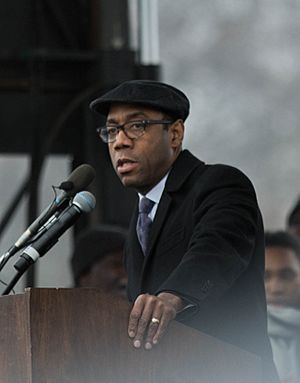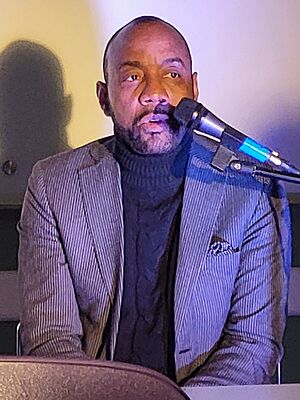Cornell William Brooks facts for kids
Quick facts for kids
Cornell William Brooks
|
|
|---|---|
 |
|
| President and CEO of the NAACP | |
| In office May 2014 – June 2017 |
|
| Preceded by | Lorraine Miller (acting) |
| Succeeded by | Derrick Johnson |
| Personal details | |
| Born | 1961 (age 64–65) El Paso, Texas, U.S. |
| Education | Jackson State University (BA) Boston University (MDiv) Yale University (JD) |
Cornell William Brooks (born in 1961) is an American lawyer and activist. He is known for his work in civil rights. From May 2014 to June 2017, he served as the president and CEO of the National Association for the Advancement of Colored People (NAACP). The NAACP is one of the oldest and most important civil rights organizations in the United States.
Before leading the NAACP, Brooks was the president of the New Jersey Institute for Social Justice. He also worked as the executive director of the Fair Housing Council of Greater Washington. He was a senior lawyer for the Federal Communications Commission (FCC), which regulates communication in the U.S. Brooks also worked as a trial attorney, fighting for civil rights.
Contents
Early Life and Education
Cornell William Brooks was born in El Paso, Texas, in 1961. He grew up in Georgetown, South Carolina. He attended Jackson State University, where he earned a bachelor's degree in political science.
He then went on to study at the Boston University School of Theology, where he received a Master of Divinity degree. Later, he earned a law degree (J.D.) from Yale Law School. While at Yale, he was a senior editor for the Yale Law Journal.
Career Highlights
Brooks started his career working for a judge on the U.S. Court of Appeals for the Fourth Circuit. In Washington, D.C., he led the FCC's Office of Communication Business Opportunities. He also served as the executive director of the Fair Housing Council of Greater Washington.
He worked as a trial attorney for the Lawyers' Committee for Civil Rights Under Law and the United States Department of Justice. In these roles, he helped people who faced discrimination, especially in housing. For example, he helped secure one of the largest government settlements for victims of housing discrimination. He also filed the government's first lawsuit against a nursing home for housing discrimination based on race.
Brooks's grandfather, James Edmund Prioleau, was also an activist. He ran for Congress in the 1940s to encourage more Black people to register to vote and join the NAACP. Following in his family's footsteps, Brooks was the Democratic candidate for U.S. Congress in Virginia's 10th District in 1998.
Before joining the NAACP, he was the president and CEO of the New Jersey Institute for Social Justice. After his time at the NAACP, Brooks has held important positions in higher education. He has been a visiting professor at Boston University and a visiting fellow at the Harvard Kennedy School. He is also a senior fellow at the New York University School of Law. Brooks often shares his insights on CNN.
Leading the NAACP
Becoming President
The NAACP's executive board chose Cornell William Brooks as their new chief executive on May 16, 2014. His appointment came at a challenging time for the organization. The NAACP was facing financial difficulties and had to lay off some staff. Brooks was chosen to help lead the organization forward.
During his time as president, Brooks guided the NAACP through a period of national unrest. He focused on a plan that included surveys, protests, and policy changes. At the NAACP's 2014 convention, he called for the organization to grow to "one million members strong."
Taking Action for Justice
In October 2014, Brooks started a "Justice Tour" across the country. The tour began in his hometown of El Paso, Texas. Its goal was to encourage people to vote and discuss social justice issues in their communities.
He also led a 7-day "Journey for Justice" march in Missouri in 2014. This march started where Michael Brown, an unarmed teenager, was shot and killed by a police officer in Ferguson. The march ended with a protest at the state Capitol Building. This activism helped lead to the Ferguson Police Department being held responsible by the Department of Justice for racial profiling.
In the summer of 2015, the NAACP continued its "Journey for Justice" with an even longer march. Staff, volunteers, and supporters marched over 1,000 miles from Selma, Alabama, to Washington, D.C. This march highlighted the importance of voting rights and police reform. It helped gather support for new voting rights laws.
In 2016, the NAACP led large protests at the U.S. Capitol. Nearly 300 groups joined to call for the restoration of the Voting Rights Act of 1965. This protest led to many arrests and was called "The Most Important Protest of the 2016 Election" by The Nation magazine.
In January 2017, Brooks and other NAACP activists held a sit-in protest at Senator Jeff Sessions' office in Alabama. They were protesting his nomination to a high government position. Brooks was arrested during this protest, which was one of the first major acts of civil disobedience against the new presidential administration.
Working for Laws and Rights
Under Brooks's leadership, the NAACP worked hard to change laws. They successfully pushed for the Missouri Municipal Fine Law after the death of Michael Brown. They also advocated for federal guidelines against racial profiling during the Obama administration. To address the issue of many people being in jail, the NAACP supported "Ban-the-Box" laws. These laws help people with past criminal records get jobs. Another important law they helped pass was the Every Student Succeeds Act (ESSA), which affects education.
Legal Victories
The NAACP's legal team achieved many important victories against laws that made it harder for people to vote. For example, the NAACP Texas State Conference won a case that saved over 600,000 votes. In North Carolina, the NAACP helped save nearly 5% of voters when a court ruled that the state's voting laws were unfair and targeted Black voters.
After children in Flint, Michigan, were poisoned by lead in their water, the NAACP took action. They organized protests and filed a federal lawsuit against Michigan and its governor to help the residents of Flint.
Media Presence
During Brooks's time, the NAACP's presence in the news, on TV, and on social media grew. Brooks often appeared on news shows like CNN's The Situation Room with Wolf Blitzer.
He was also praised for how he handled a situation involving Rachel Dolezal, a former NAACP chapter president. Brooks focused on the NAACP's main mission of fighting for civil rights, rather than getting sidetracked by the controversy.
Leaving the NAACP
On May 19, 2017, the NAACP's national board decided to remove Brooks from his position. They said it was part of a "systemwide refresh" to help the organization better fight against civil rights challenges. Many people were surprised by this decision, and some spoke out in favor of him staying. In October 2017, Derrick Johnson became the next president and CEO of the NAACP.
Personal Life
Cornell William Brooks is a fourth-generation minister in the African Methodist Episcopal Church. He decided to join the ministry while attending Jackson State University, where he met his wife, Janice. They have two sons, Cornell II and Hamilton. Brooks is also a member of the Alpha Phi Alpha fraternity.
 | Jessica Watkins |
 | Robert Henry Lawrence Jr. |
 | Mae Jemison |
 | Sian Proctor |
 | Guion Bluford |


